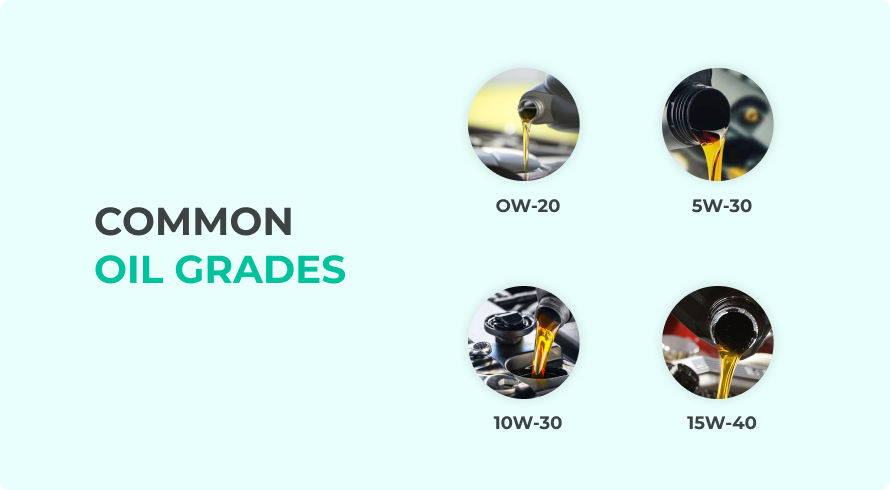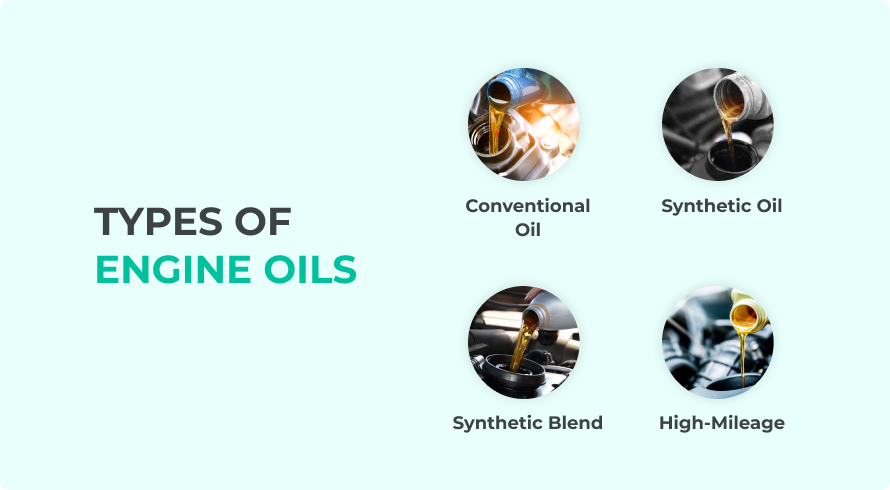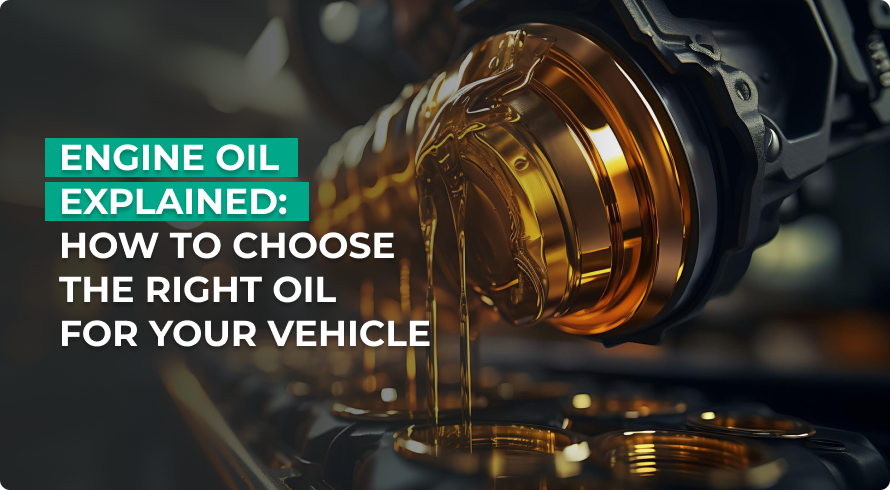Ever came across these numbers: 5W-30 or 15W-40. These are engine oil grades. And a vehicles engine health depends on choosing the right engine oil.
Engine oil lubricates the moving parts within the engine. And it also helps cool, clean, and protect it from wear and tear. However, selecting the appropriate engine oil can be confusing due to the wide variety of oil grades available. Here, we are breaking down all the information on engine oil numbers, their significance, and how to choose the best one for your vehicle.
What are engine oil grades?
Engine oil grades are a classification system that indicates the oil’s viscosity. This is required for proper engine function. Viscosity, in simple terms, is the thickness of the oil or its resistance to flow. It directly affects how well the oil flows and can lubricate engine parts under different temperature conditions.
- Low-viscosity oils are thinner and flow more easily. They are ideal for cold conditions.
- High-viscosity oils are thicker. They are better suited for hot conditions.
The right viscosity ensures that the oil can protect the engine components by forming a protective film. This reduces friction and prevents wear.
Understanding the numbers and letters
Engine oil grades, such as 5W-30 or 10W-40, are labeled with numbers and letters. These convey important information about the oil’s performance.
The First Number (e.g., 5W, 10W)
This number, followed by the letter “W,” stands for winter and indicates the oil’s viscosity at low temperatures. A lower number means the oil flows more easily in cold weather. This means the engine starts smoothly in low temperatures.
The Second Number (e.g., 30, 40)
This number represents the oil’s viscosity at high temperatures. It is typically at the engine’s normal operating temperature. A higher number indicates a thicker oil that can withstand higher temperatures without breaking down.
Multi-Grade Oils
Most modern engine oils are multi-grade. This means they are designed to perform well across a range of temperatures and can work across all seasons. For example, a 5W-30 oil is thin enough to flow well during cold starts. But remains thick enough to protect the engine at high operating temperatures.
Common oil grades explained
Understand the most commonly used oil grades. It can help you make informed decisions when maintaining your vehicle.

0W-20
0W-20 is one of the thinnest oils available. It provides better lubrication and also helps reduce friction between moving parts. This leads to fuel efficiency and longevity of engine. It is often recommended for newer, modern vehicles. 0W-20 can be used in SUVs, light trucks and vans.
5W-30
5W-30 is a versatile oil grade that offers good protection in both cold and hot conditions. It’s commonly used in a wide range of vehicles. This includes sedans, SUVs, and light trucks, due to its balance of performance and protection.
10W-30
10W-30 is slightly thicker than 5W-30 at low temperatures. This grade is often recommended for older vehicles or those that experience higher operating temperatures. It provides robust protection in a variety of driving conditions.
15W-40
15W-40 oil grade is typically used in heavier diesel vehicles like trucks and commercial vehicles. It is also used in high-performance engines. It offers excellent protection in hot conditions and is more resistant to thinning at high temperatures.
Choose the right oil grade. This directly impacts engine performance, fuel efficiency, and the longevity of your vehicle. Using an oil grade that’s too thin or too thick for your engine can lead to increased wear, reduced efficiency, and even potential engine damage.
Types of engine oils
Beyond just the grades, there are different types of engine oils available.

Conventional Oil
Conventional motor oils are derived from crude oil. They are suitable for light-duty, older or lower-performance vehicles with low mileage and simple engine design. They offer basic protection and are typically the most affordable option. However, they require more frequent oil changes compared to synthetic oils.
Synthetic Oil
Synthetic oils are chemically engineered to provide superior protection and performance. They are designed to withstand extreme temperatures. This offers better lubrication, reduced engine wear, and longer oil change intervals. Synthetic oils are often recommended for high-performance vehicles and luxury cars. It can also be used on vehicles driven in extreme conditions. They also cost more than conventional oils.
Synthetic Blend Oil
As the name suggests, synthetic blend oils are a mix of conventional and synthetic oils. They offer some of the benefits of synthetic oils. These include improved protection and better performance, at a lower cost as compared to synthetic oils. This makes them a popular choice for those looking for a balance between performance and affordability.
High-Mileage Oil
High-mileage oils are specifically formulated for vehicles with over 75,000 miles. They contain additives that help reduce oil consumption and minimize leaks. It also conditions engine seals. This type of oil is ideal for older vehicles that may have developed small oil leaks or are experiencing increased oil consumption.
Choosing the right engine oil for different vehicles
Selecting the correct engine oil involves more than just choosing the right grade. It’s also important to consider the specific needs of your vehicle.
Assessing manufacturer recommendations
Always start by checking your vehicle’s owner’s manual for the manufacturer’s recommended oil grade. This ensures that the oil you choose meets the engine’s design specifications. This provides optimal performance and avoids any potential warranty issues.
Considerations for high-performance and luxury vehicles
High-performance and luxury vehicles often have specific requirements when it comes to engine oil. These engines operate at higher temperatures. They also require oils with enhanced protective properties, such as synthetic oils. This is needed to maintain performance and longevity.
The Role of engine oil grades in vehicle maintenance
Choosing the correct engine oil grade plays a huge role in overall vehicle maintenance.
Impact on engine health
Using the right oil grade means that all moving parts within the engine are properly lubricated. This will reduce friction and wear. Long term, this prevents engine damage and extends the life of the vehicle.
Fuel efficiency
Proper viscosity helps maintain fuel efficiency. An oil that’s too thick can cause increased friction. This leads to higher fuel consumption. Conversely, an oil that’s too thin may not provide adequate protection. This will cause engine wear and reduced efficiency.
Environmental considerations
Use the correct oil grade and change it at the recommended intervals. This helps minimize the environmental impact of your vehicle. Properly maintained engines are more efficient, and produce fewer emissions. They also require less frequent oil changes, reducing waste.
Educating your customers
Many vehicle owners may not fully understand the significance of using the correct engine oil. Educating them on the importance of oil grades can help them make informed decisions. This will lead to better vehicle performance and longevity.
Create educational materials
Create brochures, posters, or digital content that explains the importance of engine oil grades. Display all the information in an easy-to-understand manner. Provide this information to enhance customer trust and satisfaction. They will appreciate the effort you take to keep them informed.
Wrapping up
Understand engine oil grades and their significance. This helps maintain a healthy and efficient vehicle. By choosing the right oil grade and type, you can ensure that your customers vehicle engine runs smoothly, efficiently, and for many miles to come. This knowledge is invaluable in making informed decisions about vehicle maintenance.
FAQs
Which engine oil grade is best for a car?
The 5W-30 is widely recommended. However, the best engine oil grade depends on the vehicle’s manufacturer’s recommendations and driving conditions.
What are the different grades of car oil?
Common car oil grades include 0W-20, 5W-30, 10W-30, and 15W-40, each suited for different temperature conditions and vehicle types.
Which oil is thicker, 5W20 or 5W30?
5W-30 is thicker than 5W-20 at higher temperatures.








